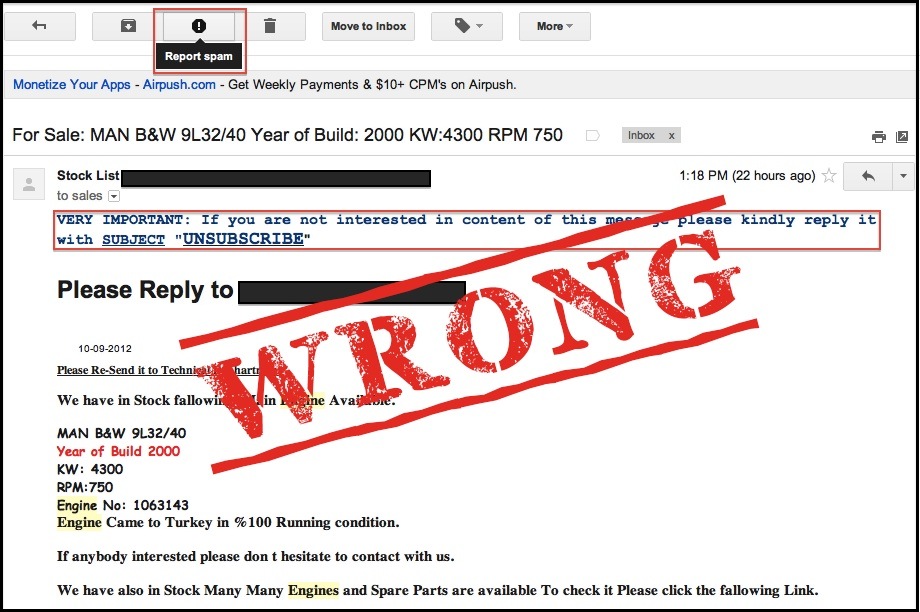
There’s always been a cloud of controversies surrounding the use of email marketing. Others seem to be doing a great job at it while a lot seem to well, naturally suck— which brings me to an email I received yesterday.

I was checking my email as usual. When I hovered my pointer onto the Inbox, there it was: a new message— with a gibberish title. All I could make out was they’re trying to sell me an engine of some sort.
Out of curiosity, I clicked on it and this is what I saw: more gobbledygook about “stock”, “engine” and “spare parts”. It even asked if anybody was interested.
This could have all been fascinating and I could’ve been excited to get this message except I wasn’t. I never knew this email would come. I don’t even know who sent this to me nor do I recall signing up for anything remotely close to buying a vessel main engine.
Of course I reported it as spam automatically. It’s the most natural thing anyone can do if they received unwanted emails, right?
Lucky for the sender, I choose not to stop on just reporting the mail as spam.
What went wrong?
As someone who’s got enough knowledge on email marketing, it’s suffice for me to say this one is nowhere near that mark. In fact, it doesn’t need a marketing genius to deem this email as a well-thought out, well-executed one.
So what went wrong with this email?
1. It’s unsolicited
I can’t remember signing up for anything that will drive me to buying an engine I’m unaware of. The email I received was completely unsolicited and I felt invaded of my privacy.
For me to receive such message makes me question the security I receive online. Obviously, it makes me question the credibility of the one or company that sent me this as well.
2. It’s impersonal
You can easily see that this email sounds very generic, like it was blasted to just about anyone they found on a list. It even exudes a robotic way of describing things, which is completely boring.
I would’ve forgiven this email if it were a tad bit interesting.
3. It’s irrelevant.
To be surprised with a random email makes the information it contains irrelevant. I prefer to feel as if they message being sent to me was important and in any way related to my interests.
I’m working along the lines of advertising and online marketing. What will I do with a vessel main engine?
What could’ve been done right?
Not only did I want to report it as spam. I’m taking this chance to point out what the sender could’ve done.
1. Mind only those who are subscribed.
Opt-in features in mailing lists allow you to send your email to only those who are subscribed. Instead of getting angry recipients reporting you as spam, you’ll be able to generate more leads and bag sales.
2. Never mislead your subscribers.
A principle in email marketing is to never deceive your subscribers. Be transparent and let them know what they are going to expect in their emails. Make it relevant to what they primarily asked for.
3. Give them the option to unsubscribe.
Despite the fact that the sender of the email above put in an Unsubscribe link, it’s still altogether suspicious. If you’re able to present a more personalized and well-crafted email, then it’s more credible to put in an Unsubscribe option.
4. Make your subscribers remember.
I may have at one point signed up to receive emails regarding cars being sold but I may have completely forgotten about it. As an email marketer, you need to re-engage your market and target those who have long forgotten about you.
Send them emails that will make them remember, not will leave them surprised and angry.
5. Learn to clean your lists.
You may be sending an email to a deceased person’s address, only to be received by a relative. Wouldn’t that be offensive?
Make sure to clean the inactive emails in your lists. If you’re careless about filtering the addresses in your subscribed lists, you will end up in an even bigger troubling situation.
In a different perspective, I should be thankful that I received this email. It reminded me of what is good, effective and quality email marketing. It made me remember just how easily a poorly executed campaign can backfire.
So before you click on “Send”, think twice. Are you simply spamming?
